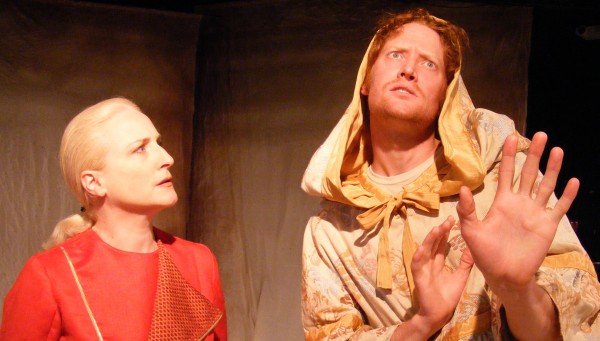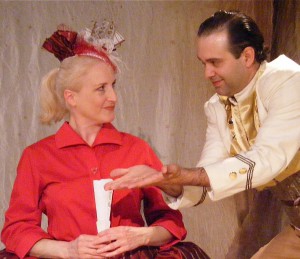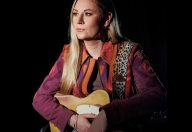‘Orlando’: a Wild Crossover Story for the Ages. And the Sexes …
- Like
- Digg
- Del
- Tumblr
- VKontakte
- Buffer
- Love This
- Odnoklassniki
- Meneame
- Blogger
- Amazon
- Yahoo Mail
- Gmail
- AOL
- Newsvine
- HackerNews
- Evernote
- MySpace
- Mail.ru
- Viadeo
- Line
- Comments
- Yummly
- SMS
- Viber
- Telegram
- Subscribe
- Skype
- Facebook Messenger
- Kakao
- LiveJournal
- Yammer
- Edgar
- Fintel
- Mix
- Instapaper
- Copy Link
Strange things happened on the opening night of Orlando. For instance, it’s a little unusual to hear an audience laughing hard and repeatedly, from the first to last scene, at a show by a Shakespeare company.
And it’s quite unusual for people to laugh hard at anything by Virginia Woolf, the stream-of-consciousness writer whose work is typically known for being mysteriously enchanting rather than a hoot.
Then again, Orlando is an unusual play. Adapted from Woolf’s novel of that name (which does have a good bit of wit in it), it’s being performed through June 21 by Unseam’d Shakespeare, the company that stages plays other than Shakespeare’s as long as they’re suitably unseamed. This one pops seams and buttons all over the place.

O humorous play, shall I compare thee to Monty Python’s work? Perhaps, but ‘Orlando’ defies easy analogy. Amy Landis (L) has the title role, both as the male and female Orlando; Jonathan Visser has multiple parts.
Time and Gender, Swords and Skirts
The play begins in the 1500s. An onstage narrator augustly informs the audience that “everything was different” then: “The age was Elizabethan. Their morals were not ours. Nor their poets, not their climate, nor their vegetables, even.”
Orlando is a young man drawn into Elizabeth’s court, where his adventures start. They continue through the centuries to the present time. Somehow Orlando remains forever young, but he does not remain “himself.” Along the way, he becomes “herself,” waking one morning to find that he is a woman.
Thus, during a scene in the early, different-vegetable days, we have the intrepid Orlando putting his fleshy sword to work in an act of sexual intercourse (simulated, of course) with a lusty Russian duchess. Later, as the play draws to a close, the ever-fashionable Orlando, decked in a red dress, sashays to her Model-T-era automobile for a drive to the department store. (Also simulated, hilariously.)
In between, Orlando is pretty much nonstop, over-the-top and below-the-belt satire. The play has fun with gender roles and identities, naturally; with Western civilization and the march of progress, generally; and with Shakespeare, even.
Daggers and Ham
The Bard gets his due in a play within the play. Orlando (portrayed across genders by Amy Landis) and his Russian hussy (Lisa Ann Goldsmith) are in London when they see actors putting on a new play. It’s Shakespeare’s Othello, and the two arrive just in time to catch the death scene, wherein the misguided Moor (Andy Kirtland) accuses poor Desdemona (Jonathan Visser, in a wig) of being unfaithful. He does her in, then plunges a dagger into his own gut.
To what extent can a double-fatality scene be hammed up? Kirtland and Visser take it to ham heaven, where lines like Othello’s “O perjured woman!” are howlers in both senses of the word. Add to that the creeping suspicion that maybe they are not butchering Shakespeare after all. Maybe the plays were played that way, back then …
What Does the Woolf Say?
But a larger question arises. Does this rollicking version of Orlando do violence to the artistic intent of Woolf and her 1928 novel?
Questions of intent and interpretation are always tricky. They’re tricky in the field of law, but more so in literature and theater. People can (and do) haggle endlessly over “meanings” in books and plays.
We won’t go there. Still, the question surfaces in regard to Orlando, if only because of the movie. A 1992 film adaptation with a young Tilda Swinton as Orlando happens to be a cult favorite. Its fans may be shocked at how different the play is in tone and mood.
The film is a stately, high-art period piece. Though sprinkled with ironic wit, it has long stretches that bathe in meditative wonder upon the story—exquisitely eerie scenes of old England, and close-ups of Swinton as she reacts to the story’s strange events. Traces of perplexity, wistful longing, and dismay flicker subtly across her ivory countenance.
So. Whereas the play is brisk and brash, the film is quiet and dreamlike. I suppose you could choose between the two, or try both, and the novel as well. But, without getting into the qualities of the novel—or the real-life events that inspired Woolf to write it—I would argue that the play does a better job than the movie of telling this very unusual story, and that it’s a good play in its own right. It brings the story to life. Into a throbbing, alive state, where you can monitor it for meanings, and will probably find some.
The stage adaptation is by the American playwright Sarah Ruhl, who lifted much of the script for Orlando (such as the morals-and-vegetables quote) straight from the novel. Written in 2006, the play has been produced in New York and elsewhere; now Unseam’d brings it to Pittsburgh.
A Strong Orlando and a Sweet Motor
Amy Landis is no Swinton, which, in my view, helps. She is of similar build but carries herself robustly, not ethereally. When she plays a man, she is a manly man. And this, in turn, makes it all the more interesting when Orlando awakes as a woman.

One thing Orlando must learn is how to be ladylike around fawning men, like this waiter (Andy Kirtland).
The character is a woman who used to be man, and must learn to act as a woman—played by an actor who, in fact, is a woman (and was acting like a man), and now must stay in character, being the same person—robust, sprightly, etc.—but doing it the way a woman would. One can see how it all gets confusing, but that’s the point, and in this production the point is very well made.
The play is performed on a nearly naked stage, with minimal sets and props. The cast is minimal, too: only five actors, with everyone but Landis in multiple roles. Goldsmith, the lusty duchess, resurfaces as the male suitor Marmaduke. The men—Kirtland and Visser, along with Brett Sullivan Santry—sometimes serve as the “chorus.” They narrate and comment on the action, or they speak Orlando’s thoughts as if s/he were thinking out loud.
Other times, as in the staging of Othello, the men play actual characters. Santry gets some star turns. His physical presence is such that he could easily be typecast as the bouncy, bald suburban dad in TV commercials. Here he is Queen Elizabeth. Also, in a non-speaking but by no means silent part, he is the automobile’s engine. His engine performance makes me want to break my personal rule about never calling anything a must-see. Let’s say it truly deserves to be seen. As does the rest of the play.
Closing Credits & Ticket Info
Virginia Woolf’s Orlando, adapted by Sarah Ruhl, is directed for Unseam’d Shakespeare Company by Robert C.T. Steele. The results suggest he’s done a lot of things right.
Orlando runs through June 21 in the Henry Heymann Theatre on the ground floor of the Stephen Foster Memorial, 4301 Forbes Ave., Oakland. For show dates, times, and tickets, visit Unseam’d or call ShowClix at 1-888-718-4253.
Photos Courtesy of Unseam’d Shakespeare
Mike Vargo is a freelance writer and editor based in Pittsburgh.
Share on Social Media
- Like
- Digg
- Del
- Tumblr
- VKontakte
- Buffer
- Love This
- Odnoklassniki
- Meneame
- Blogger
- Amazon
- Yahoo Mail
- Gmail
- AOL
- Newsvine
- HackerNews
- Evernote
- MySpace
- Mail.ru
- Viadeo
- Line
- Comments
- Yummly
- SMS
- Viber
- Telegram
- Subscribe
- Skype
- Facebook Messenger
- Kakao
- LiveJournal
- Yammer
- Edgar
- Fintel
- Mix
- Instapaper
- Copy Link
Follow Entertainment Central
Sign up for the EC Newsletter
Latest Stories







